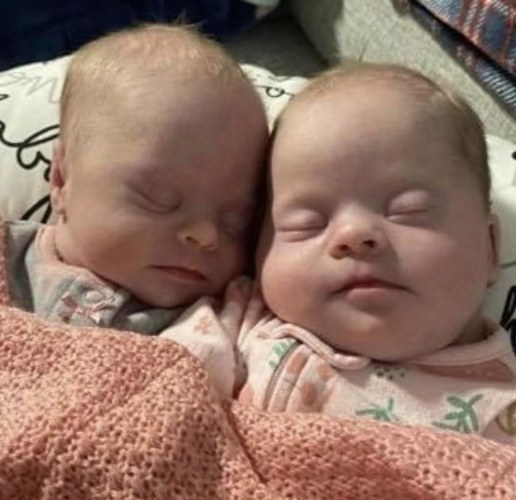Although the number of twin births has increased over the past few decades—roughly 33 out of every 1,000 births now result in twins—identical pairings are still uncommon, occurring only three to four times per thousand. The news that Savannah Combs, a 23-year-old from Middleburg, Florida, was expecting identical twin girls was already remarkable. Then, even more shockingly, she was told that both of her children had Down syndrome.
When prenatal tests revealed the genetic abnormality, Savannah and her husband, Justin Ackerman, were taken aback. Considering the medical complications that frequently accompany Down syndrome, doctors gently advised her to think about ending the pregnancy. Savannah, however, couldn’t bear to part with her daughters. She subsequently posted on TikTok, saying, “Every appointment where they were alive felt like a gift.” She vowed to bring the babies to term, determined to accept whatever lay ahead.
On May 12, 2021, Savannah gave birth to two tiny fighters, Kennadi Rue and Mckenli Ackerman, after being admitted to the hospital at 29 weeks pregnant. The kids, who were born two months early, grew stronger every day while they were in the NICU for several weeks. Savannah says that they are “mono-di twins,” meaning that although each baby had her own amniotic sac, they shared a single placenta, a rare occurrence that only happens once in 10,000 twin pregnancies. Their narrative is all but one in two million when Down syndrome is taken into account.
Savannah began advocating for her girls’ skills as soon as she brought them home. She reminds viewers that Kennadi and Mckenli are just kids learning to navigate the world on their own schedule by posting frequent updates on TikTok, including her first grins, rolling over, and muttering words. “They are emotional. Their hearts beat. Like any other child, they learn to walk and talk,” she explains. Even though it takes them a little longer to reach each milestone, her greatest ambition is to demonstrate to her daughters that they are just like their peers.
Kindness hasn’t always greeted that message of inclusion and love. One user even said, “I wouldn’t want those babies; if mine came out like that, they’d be straight up for adoption,” in the comments section of one of Savannah’s videos. Instead of reacting angrily, Savannah said quietly, “I’m so glad they weren’t born to you, but to me.” When God placed these infants with parents who would love them without conditions, He knew exactly what He was doing.
Savannah’s openness has struck a chord with thousands of people throughout it all. Her openness about the emotional and medical difficulties gives other families dealing with prenatal diagnoses hope. She speaks about possibility rather than restrictions, and her optimism is infectious. She rejoices in her girls’ every accomplishment as they mature, from their first giggles to their hesitant first steps. She asserts that even though they can choose a different path, they will eventually arrive.
Today, Mckenli and Kennadi bring endless energy, curiosity, and fun into Savannah and Justin’s house. Their matched smiles brighten every corner as they totter hand in hand across the living room floor. Savannah refers to them as her “little gems,” a term that aptly expresses their significance in her life. Their narrative serves as a reminder that all children deserve love, respect, and the opportunity to shine, regardless of their condition.
Savannah encourages everyone to see past labels and to appreciate each child’s individual beauty as she continues to chronicle her family’s journey. Let’s spread the word about her inspirational tale so that more people can witness the joy that comes from accepting differences and the strength of unconditional love.
